Is there an Olympic home advantage?
Olympic home advantage?
I really enjoyed following the Olympic games in Paris this summer, and one thing I noticed is the amazing performance of French teams and athletes. Don’t get me wrong, all athletes were performing outstandingly, and maybe I am influenced a bit by the defeats of the German basketball teams (both M and F) against France, but I started to wonder if there is such a thing as an Olympic home advantage.
I have done some work on referee bias, therefore I know that there is a well documented bias of referees in football (soccer) to advantage the home team, mostly attributed to social pressure, and high profile teams, maybe because of career concerns (see my paper on this). But is there also an advantage more broadly for athletes at the Olympics, where in many disciplines referees do not have a big influence? A quick literature search revealed: Most likely. But since I found a great data set collected by Randi Griffin, and I enjoy a bit of data analysis, I decided to give the hypothesis a basic test.
Which Olympic Games to consider?
The first Olympics held by the IOC were in 1896. Should we consider all the Olympics since then? Especially in the early 1900s, athletes may have faced travel restrictions and not been able to attend the Olympics for this and other reasons. Then the home country might have an advantage simply because of this. I decided to plot the share of athletes that competed in the Olympics over time. It seems that the share only remained constant after the Second World War. I decided to then only use data from after 1946.
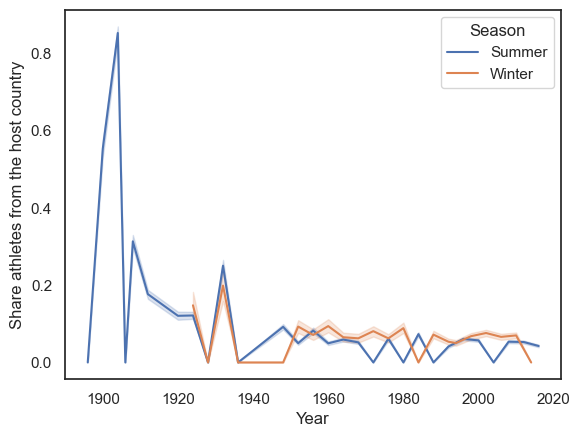
Is there a home advantage? Country-level evidence
How can we test if there is a home advantage for athletes at the Olympics? My first idea was to simply compare the share of medals per competition that athletes from hosting countries won and the share that those from non-hosting countries won. The first panel in the figure below shows that athletes from hosting countries are much more likely to win a medal in a given competition.
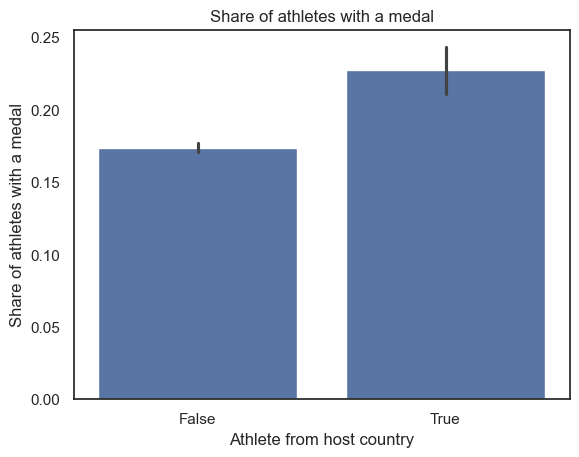
But hosting the Olympics is quite an expensive endeavor, hosting countries must be commited to the sport, this could also mean they spend more on athletic development or are economically better off than non-hosting countries. How should we countrol for this? I decided to calculate the difference in the share of medals per competition a country won between a given year and the previous Olympics. This difference should be roughly 0 if there is no home advantage. The figure below shows that non-hosting countries actually earned a similar amount of medals per competition and athlete in any two consecutive Olympics, but hosting countries earned more (though this difference is insignificant).
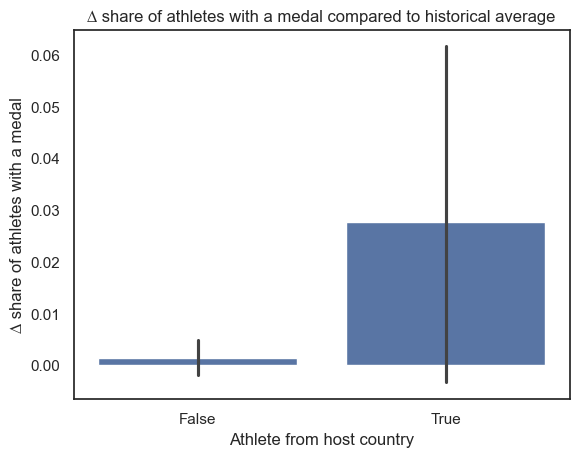
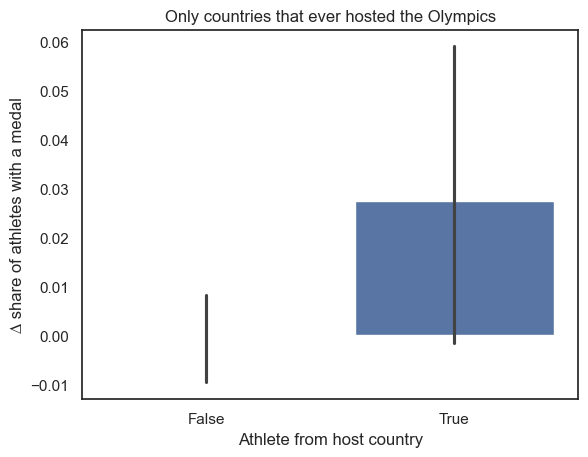
A second concern I had was that hosting countries might just be substantially different from non-hosting countries. Therefore, in the second panel, I restricted the analysis only to countries that have ever hosted the Olympics, but again, there is a slight advantage for hosting countries.
Athlete-level evidence
Prior to hosting the Olympics, a country may step up its search for newcomers and young athletes to compete in the “Home Games.” So, maybe we should look at the performance of individual athletes in consecutive Olympics, one in their home country and one in a different one. I do this in the next figure. The first panel shows the difference between the average medals per competition of an athlete in Olympic games hosted by his home country and one abroad (home medals minus abroad medals). The figure gives the clearest picture yet of a potential home advantage and does not disappear when focusing on the hosting nations only (second panel).
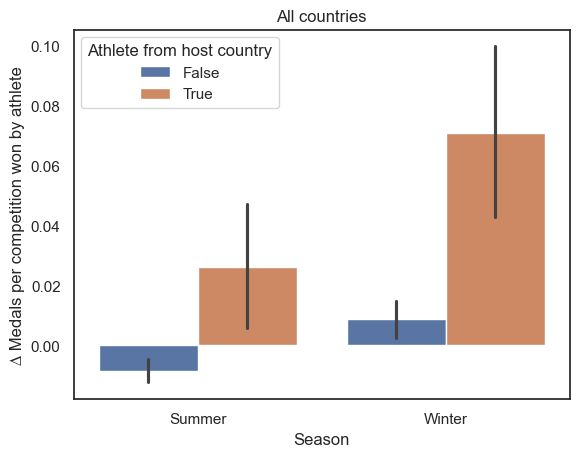
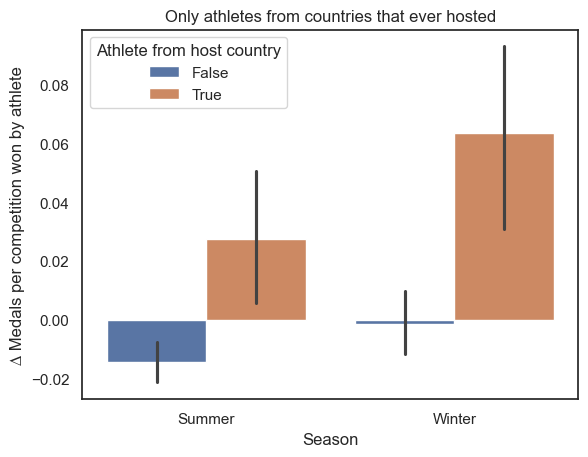
Additionally, I decided to not only control for past but also future performance. Of course now, the sample drops to athletes who competed three times in the Olympics, which is definitely not the normal amount. Nevertheless, the picture in the first and second panel below remains roughly the same.
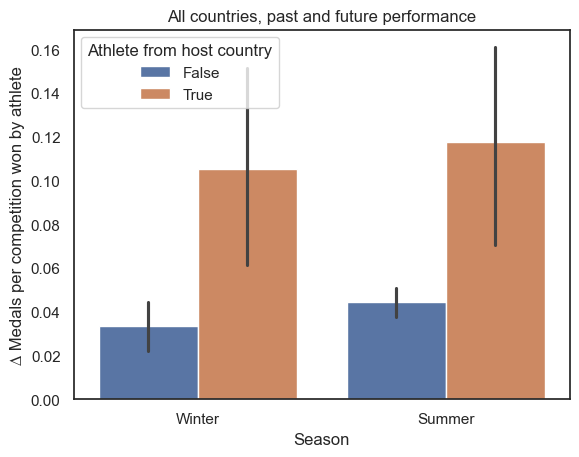
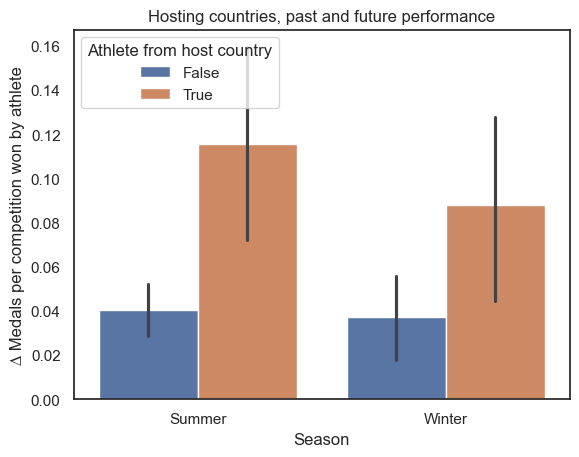
Is there a home advantage, and why?
So, is there a home advantage? The data seems to point in this direction, but there are many other reasons why the figures could show these patterns; most importantly, the controls for expected performance are not perfect, and the athlete pool constantly changes. But if we were to assume that there is a home advantage, why is it there?
There are many reasons that could explain a great performance of athletes in hosting countries. The data I used does not allow a detailed analysis of them, but I like to think that the home crowds push athletes such as the French basketball players to new heights (pun intended of course).